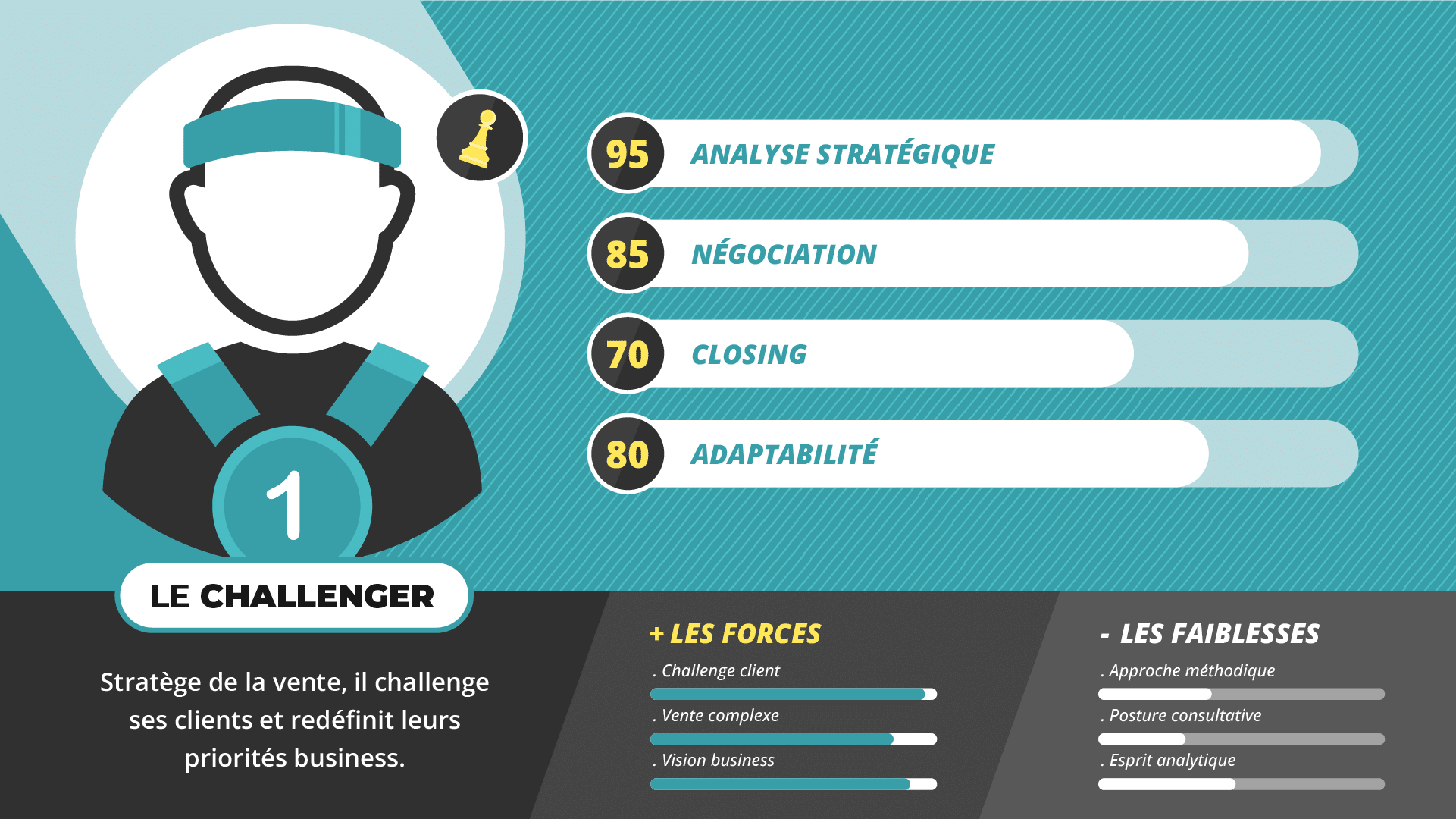In the world of sales, there is a profile that doesn't just meet customer needs: it challenges them. The Challenger Salesperson doesn't just sell a product or service, they rethink the way their customer perceives their own business.
Methodical and analytical, he immerses himself in his prospect's ecosystem to understand their challenges in depth. His objective? To bring added value that goes beyond the simple transaction, even if it means questioning his interlocutor's certainties. He excels in complex sales cycles, perfectly mastering consultative selling techniques.
However, this approach also has its limitations. Its in-depth analysis can sometimes slow down decision-making, and its lack of commercial aggressiveness prevents it from exploiting certain opportunities. Yet, when it finds the right balance, it becomes a true business strategist, capable of transforming a simple sale into a solid and lasting partnership.
Discover its strengths, weaknesses, and how to maximize its impact to close high value-added deals.
Challenger Salesperson: The ultimate asset for closing high-value deals.
The Challenger Salesperson doesn't just sell; they transform the client's perception and redefine their business priorities. Their approach is based on an in-depth analysis of each prospect, allowing them to tailor their message and propose solutions that go far beyond the expressed needs. Strategic and results-oriented, they are interested in the real issues of their clients, anticipating their problems before they even become aware of them.
Where others are content to execute, they challenge. They don't hesitate to confront their interlocutor, question their certainties, and steer the discussion towards a more profitable or innovative perspective. Their strength? Providing tangible business value that goes beyond simple product arguments to be rooted in the client's strategic vision.
This positioning is based on three fundamental pillars:
Teach: The Challenger provides impactful insights that challenge the client's preconceived notions. Rather than waiting for the client to express a need, they anticipate their expectations by providing them with a new vision of the market and trends. They lead the client to see their needs from a new angle, often by identifying opportunities or risks that they had not yet fully perceived.
Adapt: Their approach is never standardized. They know how to adjust their approach based on the context and the specific issues of each prospect. Their goal? To offer a solution that resonates with the client's real challenges by tailoring their sales pitch in a highly targeted manner.
Control: Unlike traditional salespeople who take a passive listening approach, the Challenger confidently leads the conversation. They guide decision-making, unafraid to address difficult discussions or challenge the client's assumptions. They don't seek to please but to influence constructively.
Thanks to this approach, the Challenger triggers a realization in the prospect and leads them to reconsider their strategic choices, which significantly enhances their impact in the sales process. This method enables them to achieve the best results in complex sales cycles. They actively influence decisions, create a strong perceived value, and transform each sale into a long-term business opportunity.
The Challenger Salesperson: The Strategist Who Can Hold Themselves Back.
Risk of Slowing Down Decision-Making
Their analytical and methodical approach leads them to deeply investigate each opportunity, sometimes at the expense of responsiveness. By trying too hard to optimize their sales pitch or anticipate all objections, they can unnecessarily lengthen the sales cycle and miss faster opportunities.
Too Analytical, Not Instinctive Enough
The Challenger always seeks to understand before acting. This rigor allows them to offer ultra-personalized solutions, but it can also make them hesitant and overly cautious. In a commercial environment where speed is key, they risk being outpaced by more responsive competitors.
Lack of Commercial Aggressiveness
Focused on strategy and business value, they may be too consultative and not enough closing-oriented. They prioritize the quality of the discussion over closing the deal, which can prevent them from stepping on the gas at the right time to turn an opportunity into a concrete sale.
How to know if you are a Challenger Salesperson?
Do you thoroughly analyze each client before proposing a solution? Do you enjoy arguing, challenging conventional wisdom, and guiding the thinking of your contacts? Does your strength lie in your ability to sell through value rather than brute persuasion? If these elements resonate with you, there is a high chance that you are a Challenger Salesperson.
Ask yourself these questions to be sure:
-Before selling, do you first seek to understand your client's challenges in detail?
-Do you readily challenge their assumptions to help them see a new perspective?
-Do you prefer to convince through logic and business value rather than through emotion or urgency?
-Are you more comfortable with complex sales involving multiple stakeholders?
-Do you sometimes take too long to analyze an opportunity before taking action?
If you answered yes to several of these questions, then you very likely have the profile of a Challenger Salesperson.
Want to be sure? Take our test and discover your sales profile now!
Are you a challenger salesperson?
Commercial Challenger : Les pistes pour mieux performer.
Sa capacité à challenger les clients et à vendre par la valeur est une arme redoutable, mais elle peut aussi se retourner contre lui s’il ne parvient pas à trouver le bon équilibre. Trop d’analyse, un manque de rapidité dans la prise de décision ou une approche parfois trop consultative peuvent freiner son efficacité. Voici les pistes pour l’aider à performer davantage.
Accélérer la prise de décision sans sacrifier l’analyse
Le problème : Son approche méthodique et sa volonté de bien comprendre les enjeux du client peuvent l’amener à ralentir le processus de vente. À force de vouloir tout analyser, il risque de perdre du temps et de voir certaines opportunités lui échapper.
Solution : Fixer des deadlines internes pour ne pas sur-analyser chaque deal. Utiliser des méthodes comme le BANT (Budget, Authority, Need, Timing) pour qualifier plus rapidement les prospects et éviter de perdre du temps sur des opportunités peu rentables.
Gagner en impact commercial sans être trop consultatif
Le problème : Le Challenger est excellent pour construire des relations et challenger son client, mais il peut parfois être trop dans la pédagogie et pas assez dans l’action commerciale.
Solution : Intégrer une notion d’urgence dans ses échanges commerciaux pour accélérer le closing. Par exemple, en introduisant des offres limitées dans le temps ou en mettant en avant l’impact immédiat de la solution. Adopter une approche plus directe sur certains deals peut l’aider à conclure plus rapidement.
Trouver le bon équilibre entre argumentation et écoute
Le problème : Son envie de challenger ses interlocuteurs peut parfois être perçue comme une opposition ou une confrontation, ce qui peut braquer certains prospects.
Solution : Affiner son approche en utilisant la méthode du “questionnement socratique” : poser des questions ouvertes qui amènent naturellement le client à reconsidérer sa vision, plutôt que d’imposer une remise en question brutale.
Éviter de sous-estimer l’importance du closing
Le problème : Axé sur la réflexion et la valeur ajoutée, le Commercial Challenger peut parfois négliger la conclusion du deal.
Solution : Travailler ses techniques de closing en appliquant des stratégies comme l’engagement progressif (obtenir un premier “oui” sur un petit engagement avant d’aller vers la vente principale) ou l’utilisation de scénarios comparatifs pour rendre la décision plus évidente.
En structurant son approche, en ajoutant des leviers d’urgence et en équilibrant réflexion et action, le Challenger peut conclure plus vite… et mieux.
How to develop skills as a Challenger Salesperson?
Analyzing and challenging your client is good. But to maximize its effectiveness, the Challenger Salesperson must learn to accelerate their sales cycles, to better dose their consultative approach, and to adopt more incisive strategies. This involves optimizing their closing techniques, better managing their time, and using tools adapted to their methodology.
What are the key skills to develop?
How to avoid pitfalls that limit its effectiveness?
What tools and strategies can help close deals faster and better?
Refine your sales techniques to be more impactful.
The challenge: A Challenger salesperson excels in argumentation but can waste time over-analyzing or unnecessarily challenging their prospect. They must learn to get to the point and close more effectively.
– The solution: Work on closing techniques such as the "Assumptive Close" (assuming the sale is closed and guiding the client towards signing) or the SPIN method (Situation, Problem, Implication, Need) to structure their interactions in a faster and more efficient way.
Increase speed without losing relevance.
The challenge: The Challenger's in-depth analysis is a strength, but it should not hinder the sales process. Finding the right balance between reflection and action is key.
– The solution: Use frameworks like MEDDIC (Metrics, Economic Buyer, Decision Criteria, Decision Process, Identify Pain, Champion) to quickly assess the potential of a deal and avoid dwelling on unpromising opportunities.
Structure your approach to avoid over-analysis.
The challenge: By wanting to understand everything before acting, they can waste time on complex deals. A more structured approach will help them be more effective.
– The solution: Implement a rapid lead qualification system (e.g., scoring prospects based on their potential) and use tools like Gong.io or Salesloft to analyze their own interactions and identify areas for improvement.
Develop a sense of timing and commercial urgency.
The challenge: The Challenger focuses on reflection, but in a commercial environment, reactivity is essential. They must learn to accelerate their prospect's decision-making.
– The solution: Introduce elements of urgency into their offers (e.g., limited access to certain features, bonus for quick signing) and structure an automated follow-up plan via a CRM like HubSpot or Pipedrive.
Tools and methods to advance as a Challenger Sales Representative.
Refine your sales pitch: Train in consultative selling techniques (SPIN, MEDDIC, Insight Selling) to better influence and structure your interactions.
Optimize your Sales Management: Use a high-performance CRM (Salesforce, HubSpot) and tools like Gong.io to analyze and improve your sales conversations.
Accelerate decision-making: Define a clear framework (rapid lead qualification, structured follow-up, internal deadlines) to avoid over-analysis and shorten sales cycles.
Boost Your Closing Impact: Refine your sense of timing and urgency, experiment with more direct closing techniques, and learn to transition from contemplation to action.
Get support: A customized sales coaching helps adjust their strategy, avoid analytical blocks, and maximize their performance.
A Challenger who combines strategy and speed becomes a machine for closing high-value deals!
Why is it essential to know your sales profile?
Your sales style determines your success. By precisely understanding your profile, you capitalize on your strengths, correct your weaknesses, and increase your success rate.
Leverage your strengths: Each profile has its advantages and challenges: the Explorer excels at prospecting but neglects client follow-up. The Challenger influences forcefully but can alienate prospects. Identifying your strengths and weaknesses is key to boosting your sales results.
Effectively manage your teams Understanding sales profiles allows you to place each team member where they excel: an Explorer in prospecting, a Challenger in negotiation. The result? A motivated team and optimized sales.
Avoid Costly Mistakes Ignoring your profile means repeating the same costly errors. The Explorer risks losing clients due to a lack of follow-up, while the Challenger may lose a sale due to an overly direct approach. By anticipating these pitfalls, you maximize your effectiveness.
Discover your profile: Take our test to determine your sales type and learn how to leverage your unique style.
Mastering your profile means selling better, faster, and smarter.






